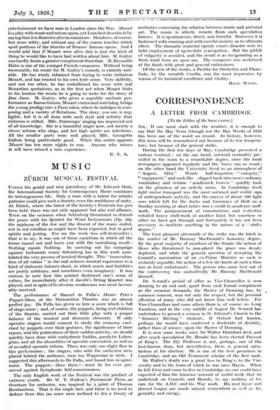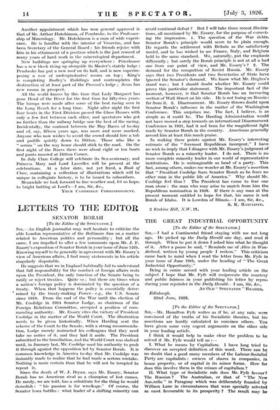CORRESPONDENCE
A LETTER FROM CAM BR! 1)(; E
[To The Editor of The SPECTATOR.]
one must start with the weather, it is enough to say that the May Term (though not the May Week) of 1926 has been one of the worst on record. In history, however, this term will be remembered not because of its low tempera- ture, but because of the general strike.
During the first ten days of May, Cambridge presented a curious contrast : on the one hand, outward normality pre- vailed in the town to a remarkable degree, since the local newspapers appeared regularly and the 'buses ran as usual ; on the other hand the University lived in an atmosphere of
"August, 1914." Words half-forgotten----" category," `' equipment," and such like—slipped back into men's ordinary vocabulary and certain " academick Lowers" quickly took on the grimness of an orderly room. In Cambridge itself light motor transport was the most outward and visible sign of undergraduate activity, and the convoy of about 100 light ears which left for the docks and tramways of Hull oh a Sunday morning at short notice was a credit to academic staff- work. The postponement of examinations and festivities entailed heavy staff-work of another kind, but somehow or other we have got through and fortunately it has not been necessary to institute anything in the nature of a " strile degree."
The least pleasant aftermath of the strike was the hitch in the matter of Mr. Ramsay MacDonald's honorary degree. By the great majority of members of the Senate the action of those who threatened to non-plaeet the grace was deeply deplored, and while the general question of necepting the Council's nomination of an ex-Prime Minister as such is certainly arguable, the action of a few die-hards at such a time was at least unfortunate. The person who came best out of the controversy was undoubtedly Mr. Ramsay MacDonald himself.
Dr. Seward's period of office as Vice-Chancellor is now drawing to an end and, apart from such formal compliment as the occasion demands, the Master of Downing has, by common consent, won not only the respect, but the personal affection of many who did not know him well before. For Vice-Chancellors and some others there is, of course, no Long Vacation, and in the very middle of August Dr. Seward has undertaken to preach a sermon in St. Edward's Church to the "Summer Meeting" students. If Oxford had known, perhaps she would have conferred a doctorate of divinity, rather than of science, upon the Master of Downing.
It is now some weeks since Sir Walter Durnford died, and after much speculation Dr. Brooke has been elected Provost of King's. The Ely Professor is not, perhaps, one of the hest-known dons, but nevertheless, there is general satis- faction at his election. He is one of the best preachers in Cambridge, and an Old Testament scholar of the first rank.
Sir Walter's death was a great loss to King's, to the Uni- versity and to the town of which he was once Mayor. When he left Eton and came to live in Cambridge, no one could have expected of him the immense amount of useful work that he undertook on Councils and Boards, to say nothing of his care for the A.D.C. and his War work. His neat figure and shrewd tongue are much missed everywhere as well as his geniality and energy.
Another appointment which has won general approval is that of Mr. Arthur Hutchinson, of Pembroke, to the Professor- ship of Mineralogy. Mr. Hutchinson is a man of wide experi- ence. He is familtar with the interior of Vesuvius, and has been Secretary of the General Board ; his friends rejoice with him in his attainment of a position which is the just reward of many years of hard work in the mineralogical department.
New buildings are springing up everywhere : Peterhouse has a new block rising up alongside its Master's stately lodge ; Pembroke has put a new roof on its hall, and is now superim- posing a row of undergraduates' rooms on top ; King's is completing Bodley's Buildings and contemplates the destruction of at least part of the Provost's lodge ; Jesus has new rooms in prospect.
All the world knows by this time that Lady Margaret has gone Head of the River for the first time for fifty-two years. The bumps were made after some of the best racing seen in the Long Reach for a long time. Night after night the first four boats in the First Division passed the Glass Houses with only a few feet between each other, and spectators who got no further than the railway bridge saw the best of the racing. Incidentally, the contrast between the May Races of to-day and of, say, fifteen years ago, was more and more marked. Anyone who now wishes to avoid the crowd should hire a tub and paddle quietly down to Ditton. Those who like a " serum " on the way home should stick to the road. On the first night of the Races there were about eight or ten boats and punts moored at Ditton Corner.
In July Clare College will celebrate its Sex-centenary, and Princess Mary and Lord Lascelles will be present at the celebrations. At a later date, not yet fixed, a Book of Clare, containing a collection of illustrations which will be unique in collegiate history, is to be issued to subscribers.
Meanwhile we look forward to fine weather and, let us hope, to bright batting at Lord's—I am, Sir, &c.,
YOUR CAMBRIDGE CORRESPONDENT.











































 Previous page
Previous page